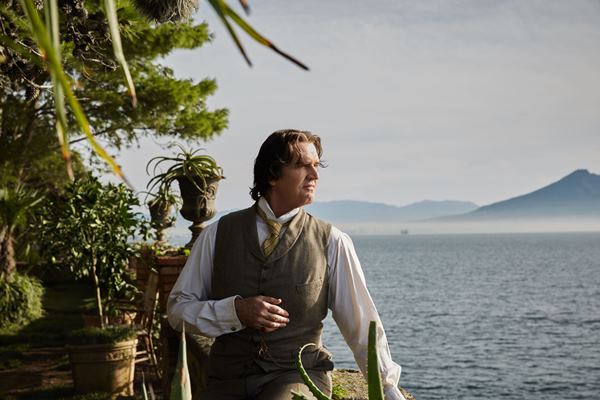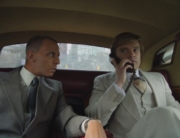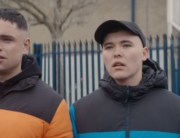Written and directed by Rupert Everett, The Happy Prince is a passion project and a rich feast for the eyes, a banquet for the ears, and an all-you-can eat buffet for lovers of stirring and emotionally committed acting. The only undernourishment lies in the script. Like many a work of passion, this story of Oscar Wilde’s last stand could have used a set of colder, more rigorous eyes, but the film’s embrace of a soul facing a squalid end holds power all the same.
Broken by his 1895 trial for gross indecency and a grueling term in prison, Wilde is now on the wave-battered, slimy rocks. The former London high society darling is reduced to cadging drinks from old luvvie acquaintances on the streets of Paris, and he struggles daily to pay the rent (and rent boys). The narrative reconstructs the last chapter of the doomed writer’s life as he careens from Paris to Naples and back, wracked by trouble and indecision.
Regrets follow Wilde everywhere he goes. He’s haunted by the memory of his martyred wife, Constance (Emily Watson); guilt-ridden by his inability to reciprocate the love of a loyal friend, Robbie Ross (Edwin Thomas); and misses desperately his sons. The only people he can love without regret are a pair of Parisian urchins, who are depicted a little too sentimentally as a child acolyte and a teenage F-buddy. And of course, the beautiful Bosie (a toothsome Colin Morgan), who got him into this trouble in the first place. Reuniting with Bosie is about to run Wilde through his final circle of hell.
For all the misery of Wilde’s last years, the script allows Everett an impressive range of moods. He has a high old time camping it up with an Edwardian music-hall song and cavorting with a gaggle of seminude Italian hunks, and he goes deeper and more affecting with tears and in sickness. A fight in a church pitting Wilde against a pack of hooting Hooray Henrys allows Everett to embody Wilde as a street fighter and a man of courage.
Where Everett falls short is in landing the famous Wildean wit; the bon mots lack sparkle and tend to sound merely bitchy. The script as a whole needs more dramatic articulation and higher stakes as Wilde fights against the dying of the light.
Where the writing falls short, lavish style and texture aim high. The slums of Paris ooze with squalor. Cinematography combines classic high-style signatures, like crisscrossing beams of light with newfangled herky-jerky camera moves and wildly saturated color. Moving trains and puffs of smoke pop up as kinetic foreground visuals. Likewise, the sound design erupts with racket: bottles smash, train whistles, and bursts of derisive laughter unsettle. Hallucinatory scenes combine gilded elegance with over-the-top absurdity—a bewigged Queen Victoria even makes an appearance side by side with Oscar’s solemn loved ones. In moments like these, The Happy Prince shines as a tribute to a life extinguished in pain but remembered for its joie de vivre and tart sophistication.







Leave A Comment